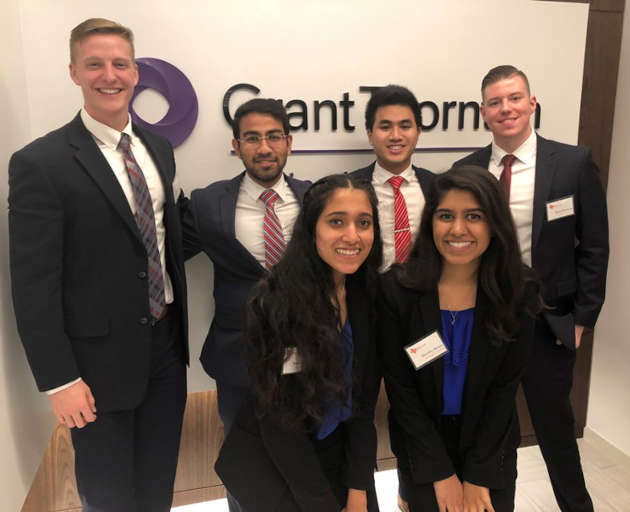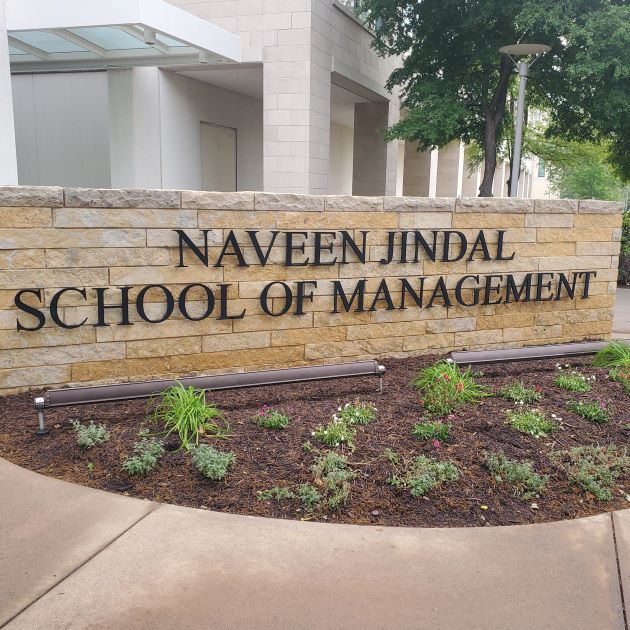
Accounting students from the Naveen Jindal School of Management competed recently against teams from six other Texas universities in Grant Thornton’s Metroplex Case Competition. The lesson they learned, that business leaders need the ability to think on their feet to succeed, earned them a second-place trophy and $2,500.
The Dallas office of Grant Thornton LLP, a regional hub of the global audit, tax and advisory membership organization, has hosted the competition since 2015, when a team from the Jindal School took first place. This year, the other participating schools included Texas A&M University, Texas Christian University, Texas Tech University and the University of North Texas, which won the first-place $7,500 award.
John Gamino, director of the undergraduate accounting program at the Jindal School, said that case competitions offer students an opportunity to delve into a real-world business problem.
“The hypothetical scenario that the students deal with mimics the challenges of professional practice very closely,” he said. “The critical-thinking and presentation skills involved are exactly the same as those needed for career success.”
The case this year focused on an accounting issue as it related to current events. The case analysis included audit, tax and advisory questions. Competing schools were required to put together teams that had varying degrees of academic experience. The UT Dallas team consisted of sophomore Sharvari Gupta, junior Keerthy Benny, seniors Kenny Nguyen and Zachary DeCamp, graduate student Patrick Sarman and alternate member Syed Saad Shahabuddin, a junior.
The Jindal School team prepared vigorously. They each devoted 10 hours a week for several weeks to make initial, general preparations. One week prior to the competition, they received the case and turned their efforts to formulating their analysis with the help of faculty advisor Gamino. Other accounting faculty members, Tiffany Bortz, Mary Beth Goodrich and Chris Linsteadt, served as coaches.
“They all gave tremendous help and feedback to us,” said team captain DeCamp. “They really coached us and transformed us from a bunch of students presenting a case to a fictional firm pitching our business, NextGen Consulting, to a client. Because of that transformation, I believe we were able to place as well as we did.”
DeCamp took on an audit partner role. The company also consisted of directors and managers who had previous experience in the industry. The teams pitched to a fictional retailer named Curate, a furniture and goods importer that was struggling to stay in business.
“We had to sell ourselves as a firm that wasn’t just provide solution for our clients but was the best choice for taking their business to the next level,” DeCamp said. “Their financials weren’t great, so we couldn’t really give them a super long-term solution. We had to think of something more short-term that would generate the cash for them.”
The teams made their presentations Oct. 26 at the Grant Thornton Dallas office. Each team presented for 30 minutes, followed by a 15-minute question-and-answer period. Each team member was required to speak for a minimum of five minutes. A judging panel consisting of two Grant Thornton employees and three Grant Thornton clients determined the winners.
As many case competitions are inclined to do, this one threw a wrench into the works. Shortly before their presentations, all the teams were informed that Curate wanted to acquire a competitor that had a successful online retail platform, but the competitor wanted to license the platform software to other companies.
“It was interesting, having to think on our feet like that,” DeCamp said. “We had literally one hour to tweak our presentation and fit this revision into it.”
DeCamp said that the team quickly had to consider whether to speed up the acquisition and keep the platform in-house, or proceed with acquiring the competitor and licensing the platform to other retailers.
“Ultimately we decided to advise them to speed up the acquisition,” DeCamp said. “While they could generate a lot of revenue from licensing this platform, they would lose the competitive advantage they would gain — which was the whole purpose of the acquisition to begin with.”





